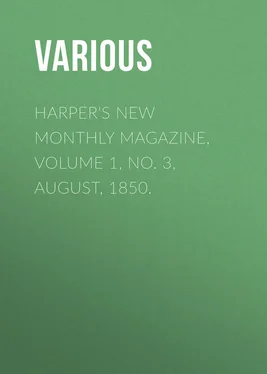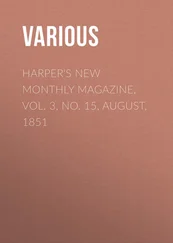Various - Harper's New Monthly Magazine, Volume 1, No. 3, August, 1850.
Здесь есть возможность читать онлайн «Various - Harper's New Monthly Magazine, Volume 1, No. 3, August, 1850.» — ознакомительный отрывок электронной книги совершенно бесплатно, а после прочтения отрывка купить полную версию. В некоторых случаях можно слушать аудио, скачать через торрент в формате fb2 и присутствует краткое содержание. Издательство: Иностранный паблик, Жанр: periodic, foreign_edu, на английском языке. Описание произведения, (предисловие) а так же отзывы посетителей доступны на портале библиотеки ЛибКат.
- Название:Harper's New Monthly Magazine, Volume 1, No. 3, August, 1850.
- Автор:
- Издательство:Иностранный паблик
- Жанр:
- Год:неизвестен
- ISBN:нет данных
- Рейтинг книги:5 / 5. Голосов: 1
-
Избранное:Добавить в избранное
- Отзывы:
-
Ваша оценка:
- 100
- 1
- 2
- 3
- 4
- 5
Harper's New Monthly Magazine, Volume 1, No. 3, August, 1850.: краткое содержание, описание и аннотация
Предлагаем к чтению аннотацию, описание, краткое содержание или предисловие (зависит от того, что написал сам автор книги «Harper's New Monthly Magazine, Volume 1, No. 3, August, 1850.»). Если вы не нашли необходимую информацию о книге — напишите в комментариях, мы постараемся отыскать её.
Harper's New Monthly Magazine, Volume 1, No. 3, August, 1850. — читать онлайн ознакомительный отрывок
Ниже представлен текст книги, разбитый по страницам. Система сохранения места последней прочитанной страницы, позволяет с удобством читать онлайн бесплатно книгу «Harper's New Monthly Magazine, Volume 1, No. 3, August, 1850.», без необходимости каждый раз заново искать на чём Вы остановились. Поставьте закладку, и сможете в любой момент перейти на страницу, на которой закончили чтение.
Интервал:
Закладка:
Various
Harper's New Monthly Magazine, Volume 1, No. 3, August, 1850
PILGRIMAGE TO THE HOME OF SIR THOMAS MORE
While living in the neighborhood of Chelsea, we determined to look upon the few broken walls that once inclosed the residence of Sir Thomas More, a man who, despite the bitterness inseparable from a persecuting age, was of most wonderful goodness as well as intellectual power. We first read over the memories of him preserved by Erasmus, Hoddesdon, Roper, Aubrey, his own namesake, and others. It is pleasant to muse over the past; pleasant to know that much of malice and bigotry has departed, to return no more, that the prevalence of a spirit which could render even Sir Thomas More unjust and, to seeming, cruel, is passing away. Though we do implicitly believe there would be no lack of great hearts, and brave hearts, at the present day, if it were necessary to bring them to the test, still there have been few men like unto him. It is a pleasant and a profitable task, so to sift through past ages, so to separate the wheat from the chaff, to see, when the feelings of party and prejudice sink to their proper insignificance, how the morally great stands forth in its own dignity, bright, glorious, and everlasting. St. Evremond sets forth the firmness and constancy of Petronius Arbiter in his last moments, and imagines he discovers in them a softer nobility of mind and resolution, than in the deaths of Seneca, Cato, or Socrates himself; but Addison says, and we can not but think truly, "that if he was so well pleased with gayety of humor in a dying man, he might have found a much more noble instance of it in Sir Thomas More, who died upon a point of religion, and is respected as a martyr by that side for which he suffered." What was pious philosophy in this extraordinary man, might seem frenzy in any one who does not resemble him as well in the cheerfulness of his temper as in the sanctity of his life and manners.
Oh, that some such man as he were to sit upon our woolsack now; what would the world think, if when the mighty oracle commanded the next cause to come on, the reply should be, " Please your good lordship, there is no other! " Well might the smart epigrammatist write:
When More some time had chancellor been,
No more suits did remain;
The same shall never more be seen,
Till More be there again!
We mused over the history of his time until we slept, and dreamed: and first in our dream we saw a fair meadow, and it was sprinkled over with white daisies, and a bull was feeding therein; and as we looked upon him he grew fatter and fatter, and roared in the wantonness of power and strength, so that the earth trembled; and he plucked the branches off the trees, and trampled on the ancient inclosures of the meadow, and as he stormed, and bellowed, and destroyed, the daisies became human heads, and the creature flung them about, and warmed his hoofs in the hot blood that flowed from them and we grew sick and sorry at heart, and thought, is there no one to slay the destroyer? And when we looked again, the Eighth Harry was alone in the meadow; and, while many heads were lying upon the grass, some kept perpetually bowing before him, while others sung his praises as wise, just, and merciful. Then we heard a trumpet ringing its scarlet music through the air, and we stood in the old tilt-yard at Whitehall, and the pompous Wolsey, the bloated king, the still living Holbein, the picturesque Surrey, the Aragonian Catharine, the gentle Jane, the butterfly Anne Bullen, the coarse-seeming but wise-thinking Ann of Cleves the precise Catherine Howard, and the stout hearted Catherine Parr, passed us so closely by, that we could have touched their garments; then a bowing troop of court gallants came on; others whose names and actions you may read of in history; and then the hero of our thoughts, Sir Thomas More – well dressed, for it was a time of pageants – was talking somewhat apart to his pale-faced friend Erasmus, while "Son Roper," as the chancellor loved to call his son-in-law, stood watchfully and respectfully a little on one side. Even if we had never seen the pictures Holbein painted of his first patron, we should have known him by the bright benevolence of his aspect, the singular purity of his complexion, his penetrating yet gentle eyes, and the incomparable grandeur with which virtue and independence dignified even an indifferent figure. His smile was so catching that the most broken-hearted were won by it to forget their sorrows; and his voice, low and sweet though it was, was so distinct, that we heard it above all the coarse jests, loud music, and trumpet calls of the vain and idle crowd. And while we listened, we awoke; resolved next day to make our pilgrimage, perfectly satisfied at the outset, that though no fewer than four houses in Chelsea contend for the honor of his residence, Doctor King's arguments in favor of the site being the same as that of Beaufort House – upon the greater part of which now stands Beaufort-row – are the most conclusive; those who are curious in the matter can go and see his manuscripts in the British Museum. Passing Beaufort-row, we proceeded straight on to the turn leading to the Chelsea Clock-house .
It is an old, patched-up, rickety dwelling, containing, perhaps, but few of the original stones, yet interesting as being the lodge-entrance to the offices of Beaufort-House; remarkable, also, as the dwelling of a family of the name of Howard, who have occupied it for more than a hundred years, the first possessor being gardener to Sir Hans Sloane, into whose possession, after a lapse of years, and many changes, a portion of Sir Thomas More's property had passed. This Howard had skill in the distilling of herbs and perfumes, which his descendant carries on to this day. We lifted the heavy brass knocker, and were admitted into the "old clock-house." The interior shows evident marks of extreme age, the flooring being ridgy and seamed, bearing their marks with a discontented creaking, like the secret murmurs of a faded beauty against her wrinkles! On the counter stood a few frost-bitten geraniums, and drawers, containing various roots and seeds, were ranged round the walls, while above them were placed good stout quart and pint bottles of distilled waters. The man would have it that the "clock-house" was the "real original" lodge-entrance to "Beaufort House;" and so we agreed it might have been, but not, " perhaps " built during Sir Thomas More's lifetime. To this insinuation he turned a deaf ear, assuring us that his family, having lived there so long, must know all about it, and that the brother of Sir Hans Sloane's gardener had made the great clock in old Chelsea Church, as the church books could prove. "You can, if you please," he said, "go under the archway at the side of this house, leading into the Moravian chapel and burying-ground, where the notice, that 'within are the Park-chapel Schools,' is put up." And that is quite true; the Moravians now only use the chapel which was erected in their burying-ground to perform an occasional funeral service in, and so they "let it" to the infant school. The burying-ground is very pretty in the summer time. Its space occupies only a small portion of the chancellor's garden; part of its walls are very old, and the south one certainly belonged to Beaufort House. There have been some who trace out a Tudor arch and one or two Gothic windows as having been filled up with more modern mason-work: but that may be fancy. There seems no doubt that the Moravian chapel stands on the site of the old stables.
"Then," we said, "the clock-house could only have been at the entrance to the offices." The man looked for a moment a little hurt at this observation, as derogatory to the dignity of his dwelling, but he smiled, and said. "Perhaps so;" and very good-naturedly showed us the cemetery of this interesting people. Indeed, their original settlement in Chelsea is quite a romance. The chapel stands to the left of the burying-ground, which is entered by a primitive wicket-gate; it forms a square of thick grass, crossed by broad gravel walks, kept with the greatest neatness The tombstones are all that, and the graves not raised above the level of the sward. They are of two sizes only: the larger for grown persons, the smaller for children. The inscriptions on the grave-stones, in general, seldom record more than the names and ages of the persons interred. The men are buried in one division, the women in another. We read one or two of the names, and they were quaint and strange: "Anne Rypheria Hurloch;" "Anna Benigna La Trobe;" and one was especially interesting, James Gillray, forty years sexton to this simple cemetery, and father of Gillray, the H. B. of the past century. One thing pleased us mightily, the extreme old age to which the dwellers in this house seemed to have attained.
Читать дальшеИнтервал:
Закладка:
Похожие книги на «Harper's New Monthly Magazine, Volume 1, No. 3, August, 1850.»
Представляем Вашему вниманию похожие книги на «Harper's New Monthly Magazine, Volume 1, No. 3, August, 1850.» списком для выбора. Мы отобрали схожую по названию и смыслу литературу в надежде предоставить читателям больше вариантов отыскать новые, интересные, ещё непрочитанные произведения.
Обсуждение, отзывы о книге «Harper's New Monthly Magazine, Volume 1, No. 3, August, 1850.» и просто собственные мнения читателей. Оставьте ваши комментарии, напишите, что Вы думаете о произведении, его смысле или главных героях. Укажите что конкретно понравилось, а что нет, и почему Вы так считаете.












